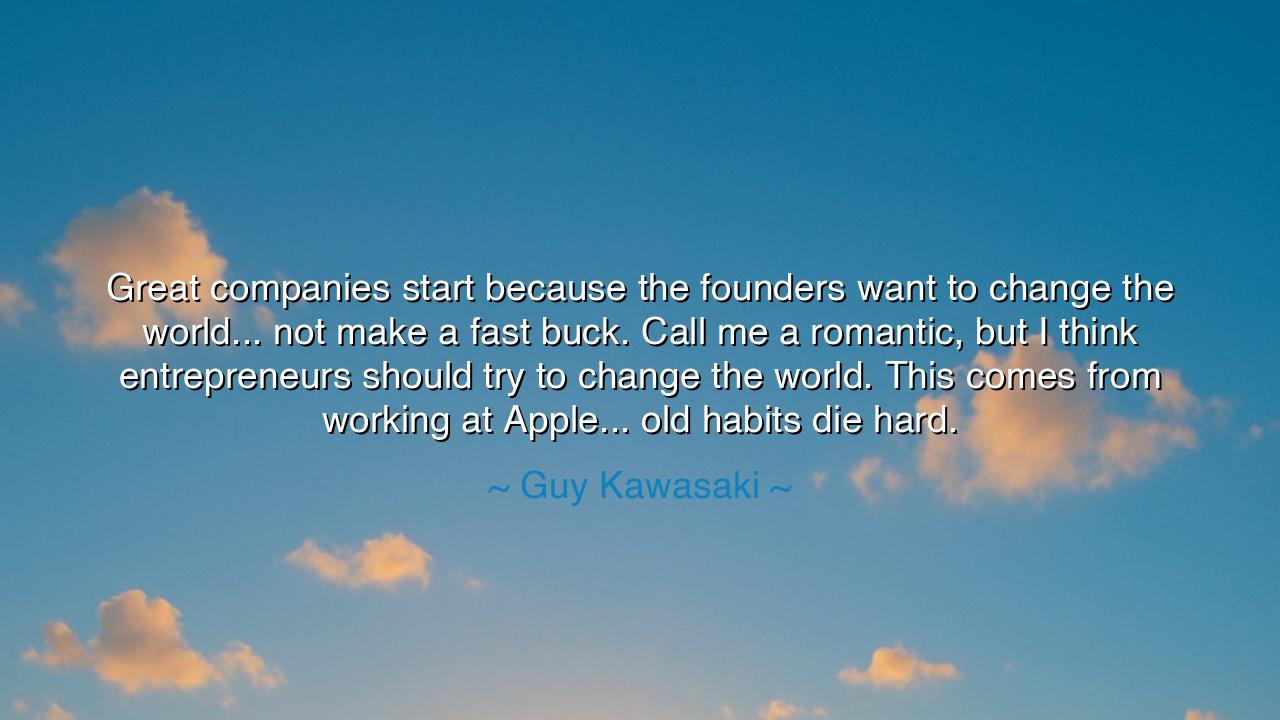
Great companies start because the founders want to change the
Great companies start because the founders want to change the world... not make a fast buck. Call me a romantic, but I think entrepreneurs should try to change the world. This comes from working at Apple... old habits die hard.






“Great companies start because the founders want to change the world… not make a fast buck. Call me a romantic, but I think entrepreneurs should try to change the world. This comes from working at Apple… old habits die hard.” So speaks Guy Kawasaki, and in his words we hear not the fleeting chatter of commerce, but the echo of an ancient truth: that true greatness is born not of greed, but of vision. For money may fill the hand, but only purpose fills the soul, and it is purpose that builds legacies that outlast the grave.
In this declaration, Kawasaki reveals the heart of all entrepreneurship at its noblest. To found a company merely for profit is to build on sand; the wind and tide will erode it in time. But to found a company on the desire to change the world is to build upon stone, to raise a structure that stands long after its builders are gone. Such companies are not mere machines for wealth—they are instruments of transformation, carriers of ideas that alter the way humanity lives, dreams, and speaks.
Consider the example of Apple, from which Kawasaki draws his conviction. Its founders, Steve Jobs and Steve Wozniak, were not content to tinker for coin. They dreamed of bringing computing power into every hand, of tearing down the walls between humans and machines, of shaping a future where imagination and technology would walk hand in hand. Their journey was not without hardship, and yet their devotion to changing the world transformed not only industry but culture itself. From their vision, an age was born in which entire societies learned to think, create, and connect anew.
The ancients, too, understood this difference between gold and greatness. Alexander the Great did not march eastward simply to amass treasure, but to spread a vision of a world united under Hellenic culture, a blending of East and West. His empire, though it crumbled, left behind libraries, philosophies, and sciences that shaped civilization. So it is with founders of true spirit: their works may falter in form, but their influence endures, because it springs from a desire larger than the self.
Kawasaki calls himself a romantic, yet this is no weakness. To be romantic in this sense is to see beyond the numbers on a ledger, to dream of a horizon not yet visible. It is the courage to believe that a group of inspired souls, though small in number, can shift the balance of the world. The cynic mocks such dreams, the opportunist dismisses them, but history remembers the dreamers, not the accountants of fleeting wealth.
From this arises the lesson: if you would build, build not for silver but for significance. Ask not only, “What profit will this bring me?” but, “What change will this bring to the world?” Let your work be a gift, not only to yourself, but to generations yet unborn. The wealth will follow, as rivers follow the mountain rains, but wealth without vision is a desert, while vision with or without wealth is a spring of life.
Therefore, dear listener, take this wisdom into your own endeavors. If you labor in business, let your aim be transformation, not mere gain. If you lead, lead with vision, not with hunger alone. And in all things, remember Kawasaki’s creed: that the habits of dreaming, once learned, are not easily lost, and that the true calling of the entrepreneur is not to chase coins, but to change the world. For in this pursuit lies not only success, but immortality.






AAdministratorAdministrator
Welcome, honored guests. Please leave a comment, we will respond soon